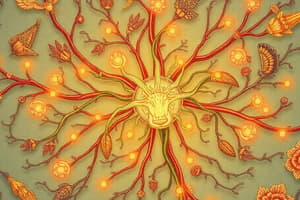Podcast
Questions and Answers
What is the role of the axon in a nerve cell?
What is the role of the axon in a nerve cell?
- It supplies energy for cell activity.
- It integrates sensory information.
- It conducts impulses away from the cell body. (correct)
- It carries impulses towards the cell body.
Which of the following describes the corpus callosum?
Which of the following describes the corpus callosum?
- A part of the spinal cord.
- A section responsible for hormone production.
- A deep bridge of nerve fibers connecting the brain's hemispheres. (correct)
- A network of blood vessels in the brain.
What is synaptic transmission?
What is synaptic transmission?
- The transportation of nutrients within the cell.
- The communication between nerve cells through neurotransmitters. (correct)
- The integration of sensory inputs in the brain.
- The process of muscle contraction.
Which area of the brain is primarily responsible for initiating response messages to muscles and glands?
Which area of the brain is primarily responsible for initiating response messages to muscles and glands?
Why is studying the nervous system important?
Why is studying the nervous system important?
What is the primary focus of physiological psychology?
What is the primary focus of physiological psychology?
Who developed the first comprehensive theory linking brain activity to complex psychological phenomena?
Who developed the first comprehensive theory linking brain activity to complex psychological phenomena?
Which Nobel Prize winner's work in 1963 contributed to the understanding of the ionic basis of neural transmission?
Which Nobel Prize winner's work in 1963 contributed to the understanding of the ionic basis of neural transmission?
What did Ivan Pavlov's 1904 research focus on?
What did Ivan Pavlov's 1904 research focus on?
In what year was the work 'The Organization of Behavior' published?
In what year was the work 'The Organization of Behavior' published?
Which pair of scientists were recognized for their study of the auditory system in 1961?
Which pair of scientists were recognized for their study of the auditory system in 1961?
What major discovery was made by Otto Loewi in 1936?
What major discovery was made by Otto Loewi in 1936?
Which of the following research findings is NOT associated with Walter Hess?
Which of the following research findings is NOT associated with Walter Hess?
Which researcher is known for work related to the chemistry and physiology of the visual system?
Which researcher is known for work related to the chemistry and physiology of the visual system?
What was the significant contribution of Karl von Frisch in 1973?
What was the significant contribution of Karl von Frisch in 1973?
Flashcards are hidden until you start studying
Study Notes
Nature and Scope of Biological Psychology
- Physiological Psychology examines biological underpinnings of human behavior.
- Focuses on nervous system structure, functions, and the neuroendocrine system.
- Emphasizes recent research in neuroanatomy and neurophysiology.
- Physiology studies tissue dynamics and organ systems, while Psychology analyzes coping mechanisms of organisms.
- Biopsychology merges biology with human behavior research, rooted in O.D. Hebb's theory from 1949.
- "The Organization of Behavior" is pivotal in understanding perceptions, emotions, thoughts, and memories linked to brain activity.
Importance of Physiological Psychology
- Explores relationships between biological systems and psychological functioning.
Notable Accomplishments in Neuroscience
- Ivan Pavlov (1904): Researched digestion physiology.
- Camilo Golgi & Ramon Cajal (1906): Studied nervous system structure.
- Charles Sherington & Edgar Adrian (1932): Investigated nervous system functions.
- Henry Dale & Otto Loewi (1936): Discoveries about nerve impulse transmission.
- Joseph Erlanger & Herbert Gasser (1944): Studied single nerve fiber functions.
- Walter Hess (1949): Examined brain’s role in behavior control.
- George Von Bekesy (1961): Researched auditory system.
- John Eccles, Allan Hodgkin, and Andrew Huxley (1963): Focused on ionic basis of neural transmission.
- Bernard Katz et al. (1970): Studies on synaptic transmission.
- Herbert Simon (1979): Researched human cognition.
The Nervous System
- Understanding the nervous system elucidates sensory functions and their role in perception.
- Relation of internal states (emotions and drives) to neural activity is vital.
- Insights into learning and memory processes through brain cell functions.
- Practical implications for behavioral disorders and maladjustment.
Basic Questions about the Human Brain
- Investigates fundamental aspects of brain structure and function.
Microscopic View of the Nervous System
- Nerve cells consist of nuclei controlling metabolic activities and genetic instruction.
- Nerve cells integrate sensory data and conduct impulses away from the cell body.
- Axonal transport enables material movement from the cell body to axons and dendrites.
Types of Nerve Cells
- Glial cells are the most abundant in the primate brain with various supportive functions.
Synaptic Transmission
- Essential process for communication between nerve cells.
The Central Nervous System
- Comprised of major structures like the diencephalon, telencephalon, hippocampus, and corpus callosum.
- Corpus callosum connects cerebral hemispheres facilitating interhemispheric communication.
Lobes of the Brain
- Different brain areas are responsible for specific sensory and motor functions through specialized projection areas.
Studying That Suits You
Use AI to generate personalized quizzes and flashcards to suit your learning preferences.




